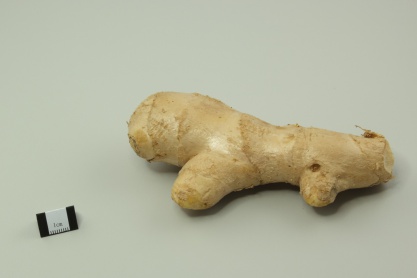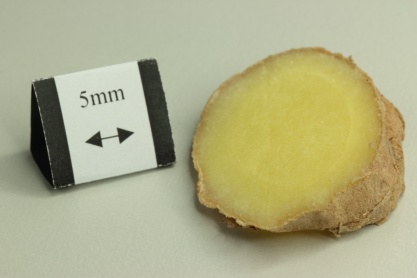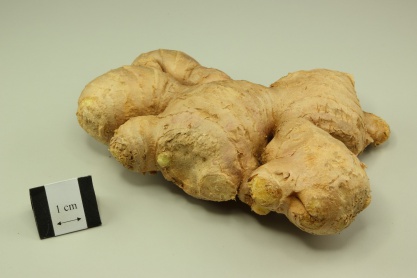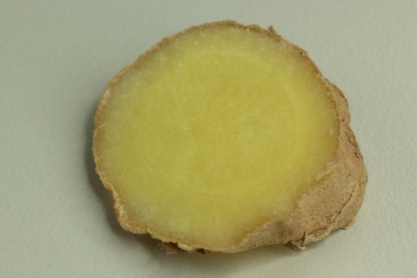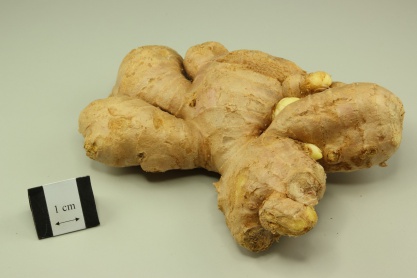生薑
- ENG
- Fresh Ginger
- LATIN
- Zingiberis Rhizoma Recens
| Medicinal Group | Wind-cold-dispersing medicinal |
|---|---|
| Source | Fresh rhizome of Zingiber officinale (Willd.) Rosc. (Fam. Zingiberaceae) |
| Nature and Flavors | pungent; slightly warm |
| Meridian Affinity | Spleen, Lung, Stomach |
| Actions | To release the exterior and dissipate cold, warm the middle energizer to check vomiting, reslove phlegm and suppress cough, reduce toxin of fishery product |
Family
Zingiberaceae
Part used
Rhizome
Indications
Common cold caused by wind-cold, vomiting caused by stomach cold, cough with cold-phlegm, fishery product poisoning
Research Findings
- 3 months supplementation of ginger improved glycemic indices and total antioxidant capacity in patients with type 2 diabetes. [1]
- Prodigest®, a standardized extract of ginger and artichoke, could significantly promote gastric emptying in healthy volunteers without being associated with notable adverse effects.[2]
- Ginger supplementation could improve insulin sensitivity and some fractions of lipid profile in type 2 diabetic patients.[3]
- Treatment of primary dysmenorrhea in students with ginger for 5 days had a statistically significant effect on relieving intensity and duration of pain.[4]
- Ginger powder has add-on effect on reducing the symptoms of osteoarthritis of knee with acceptable safety profile.[5]
- Ginger supplementation at a daily dose of 0.5 g-1.0 g significantly aids in reduction of the severity of acute chemotherapy-induced nausea in adult cancer patients.[6]
- Daily consumption of raw and heat-treated ginger resulted in moderate-to-large reductions in muscle pain following exercise-induced muscle injury.[7]
- Ginger can be considered as a useful treatment option for women suffering from morning sickness.[8]
Cautions
No Data.
Report on adverse effect
Synergistic effect on the inhibition of platelet aggregation, when nifedipine and ginger were used together
May enhance risk of bleeding when ginger is used together with warfarin
Increased INR when taking warfarin and ginger
Reference
Reference
- Shidfar F, Rajab A, Rahideh T, Khandouzi N, Hosseini S, Shidfar S. ( 2015). The effect of ginger (Zingiber officinale) on glycemic markers in patients with type 2 diabetes. J Complement Integr Med. , 12(2):165-70. doi: 10.1515/jcim-2014-0021.
- Lazzini S, Polinelli W, Riva A, Morazzoni P, Bombardelli E. (2016). The effect of ginger (Zingiber officinalis) and artichoke (Cynara cardunculus) extract supplementation on gastric motility: a pilot randomized study in healthy volunteers. Eur Rev Med Pharmacol Sci. , 20(1):146-9.
- Mahluji S, Attari VE, Mobasseri M, Payahoo L, Ostadrahimi A, Golzari SE. (2013). Effects of ginger (Zingiber officinale) on plasma glucose level, HbA1c and insulin sensitivity in type 2 diabetic patients. Int J Food Sci Nutr. , 64(6):682-6. doi: 10.3109/09637486.2013.775223. Epub 2013 Mar 18.
- Rahnama P, Montazeri A, Huseini HF, Kianbakht S, Naseri M. ( 2012 ). Effect of Zingiber officinale R. rhizomes (ginger) on pain relief in primary dysmenorrhea: a placebo randomized trial. BMC Complement Altern Med. , 12:92. doi: 10.1186/1472-6882-12-92.
- Paramdeep G. (2013). Efficacy and tolerability of ginger (Zingiber officinale) in patients of osteoarthritis of knee. Indian J Physiol Pharmacol. , 57(2):177-83.
- Ryan JL, Heckler CE, Roscoe JA, Dakhil SR, Kirshner J, Flynn PJ, Hickok JT, Morrow GR. (2012). Ginger (Zingiber officinale) reduces acute chemotherapy-induced nausea: a URCC CCOP study of 576 patients. Support Care Cancer. , 20(7):1479-89. doi: 10.1007/s00520-011-1236-3. Epub 2011 Aug 5.
- Black CD, Herring MP, Hurley DJ, O'Connor PJ. (2010). Ginger (Zingiber officinale) reduces muscle pain caused by eccentric exercise. J Pain. , 11(9):894-903. doi: 10.1016/j.jpain.2009.12.013. Epub 2010 Apr 24.
- Willetts KE, Ekangaki A, Eden JA. (2003). Effect of a ginger extract on pregnancy-induced nausea: a randomised controlled trial. Aust N Z J Obstet Gynaecol. , 43(2):139-44.
- Ulbricht, C., Chao, W., Costa, D., Rusie-Seamon, E., Weissner, W., & Woods, J. (2008). Clinical evidence of herb-drug interactions: A systematic review by the natural standard research collaboration. Current Drug Metabolism, 9(10), 1063-1120.
- Saw, J. T., Bahari, M. B., Ang, H. H., & Lim, Y. H. (2006). Potential drug-herb interaction with antiplatelet/anticoagulant drugs. Complementary Therapies in Clinical Practice, 12(4), 236-241.
- Chan, H., So, L., Li, S., Siu, C., Lau, C., & Tse, H. (2011). Effect of herbal consumption on time in therapeutic range of warfarin therapy in patients with atrial fibrillation. Journal of Cardiovascular Pharmacology, 58(1), 87-90.


